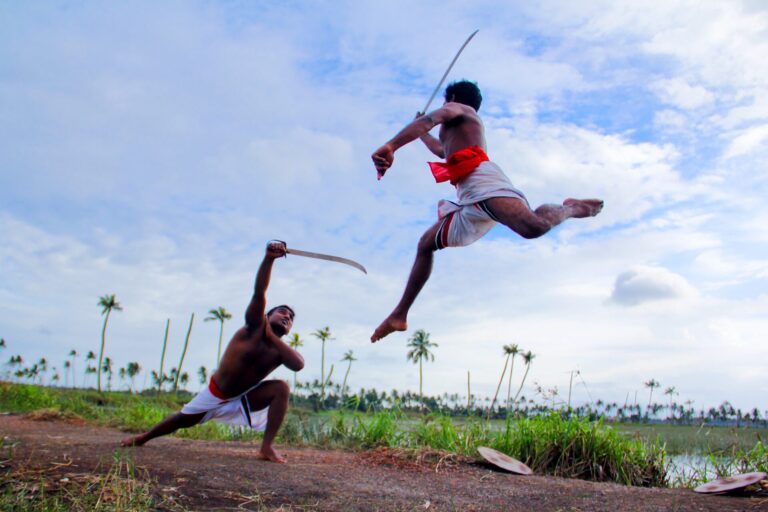How a 16th-century duel in a remote village created a historic venue for the world’s oldest martial art form.
Once again, Ponniam, a village in Northern Kerala is getting ready for the annual cultural event of “Ponnyathankam” – the World’s largest Kalaripayattu festival. The seven-day event begins on the Malayalam month of Kumbam 9 every year.
A mammoth crowd of humanity assembles to watch the breath-taking feats performed by the exponents. The significance of this heritage project could be gauged from the fact that Kerala government allocated Rs eight crores for the 16th century Ponniyathankam in the budget this year.
Kalaripayattu is the world’s oldest surviving martial art form that Kerala can boast of. It is believed to have been practiced 3000 years ago. Interestingly, the history of Kalaripayattu is closely linked to the social and cultural milieu of Kerala.
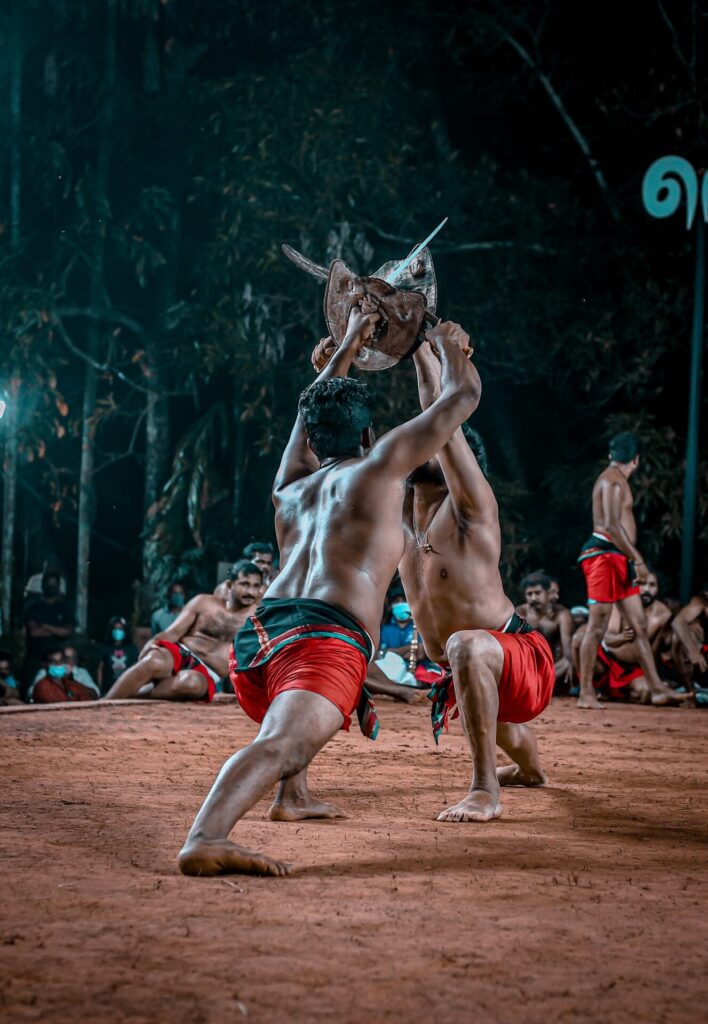
Kalaripayattu (simply called Kalari) has different styles like Thekkan (Southern style) and Vadakkan (Northern style) with minor regional variations in terms of practices. The warriors trained were noted for their flexibility of bodies and also in handling special hand weapons. They were highly respected in the society. Further, caste, religion or gender was not a criterion for getting trained in this martial art.
The legacy of Thacholi Othenan
The talented Kalaripayattu warriors were recruited by local rulers and respected by the people. They were called Chekavars. The Chekavars represented their rulers and engaged in the local disputes. It was customary to declare a date, venue and time for the fight between the warriors. These duels were called “Ankams”
An Ankam is held in an arena called “Ankathattu”. The rulers who represented the warriors, along with their courtiers and servants would be watching the event with much enthusiasm apart from the local people also assembled in large numbers to watch this rare event. At the end of the Ankam, the defeated warrior getting killed was considered normal!
In the 16th century, there lived an extraordinarily talented Chekavar called Thacholi Othenan. He was from Manikkoth Kovilakath at Thacholi, near Vatakara.
The stories of Thacholi Manikoth Othenan Kurup, along with stories Puthooram Veedu (another famous Kalaripayattu family) comprise the majority of Kerala’s traditional Vadakkan Pattukal (Ballads from the North).
Thacholi Othenan is remembered as one of the greatest warriors in those Ballads. His humanitarian gestures have parallels to those of Robinhood.
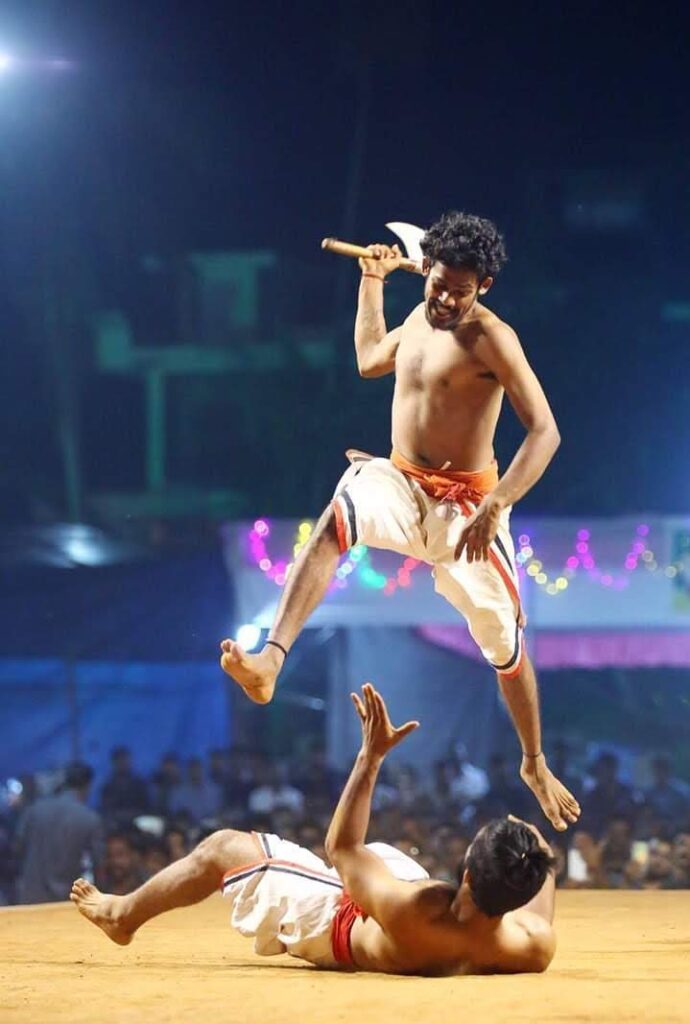
The Ponnyathankam (Ponnyath Ankam – Ankam at Ponniam) derives its name from the venue, Ponniam in the Kadirur panchayat of Kannur district, Kerala.
There was a very famous Kalari Teacher (Gurukkal) called Mathiloor Gurukkal (also known as Kadirur Gurukkal) who trained tens of thousands of students at Kadirur. Thacholi Othenan also had his initial training from Mathiloor Gurukkal.
The story
On a festival day at Othenan’s at Lokanarkkavu temple, Othenan and Kadirur Gurukkal quarreled about a derisive comment by Othenan. The Gurukkal was angry and challenged Othenan for a duel.
They fixed the date as Kumbam 9, 10, and 11 for the Ankam and fixed Ponniam Ezharakandam (a Paddy Farm area) as the Venue.
The Ponniam Ezharakandam was famous for Kalari Ankams (also called “Poyth”) at that time. In the Ballads, there is a verse that was recited to remind Othenan by his brother that Ezharakandam has seen a lot of warrior blood.
Before the fight, Othenan’s family, especially his elder brother Koma Kurupp, tried to stop him in many ways. His family was afraid of his defeat, which meant his death, by the widely recognized Kadirur Gurukkal.
Thacholi Othenan managed to be at the Ponniam Ezharakandam at the right time to start the Ankam. The Ankam lasted for 3 days – Kumbham 9, 10, and 11. After a fierce fight, finally, Thacholi Othenan defeated and killed Kadirur Gurukkal. Thacholi Othenan used a forbidden technique called “Poozhi Kadakan” to defeat the Gurukkal.
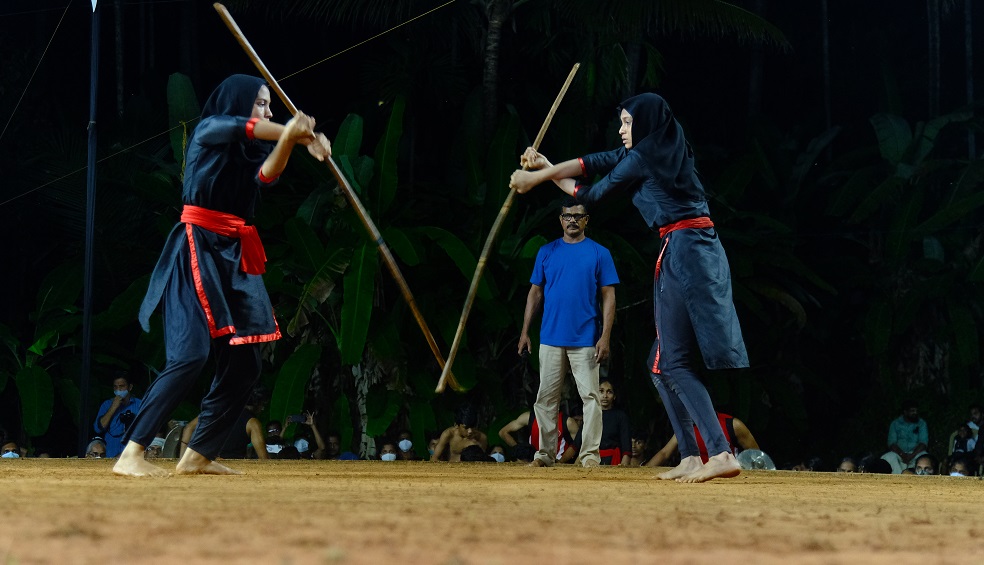
Thacholi Othenan and his team moved to Vatakara in a victory possession. Mid way, he realized that he had forgotten to carry his hand weapon (called “Kattaram”) at the Ezharakndam near the Ankathattu.
It was taboo for the Chekavas to go back to the Arena after an Ankam. His brother tried to stop him. But, Thacholi Othenan did not listen to his team. A warrior who forgot his weapon at Ankam would get portrayed as someone who got defeated and fled, he said.
A plot was set for Othenan at the Ezharakandam. Kadirur Gurukkal’s friend Parunthukkal Emman Panicker spotted the weapon and he was sure that Othenan would return to collect it. He arranged a contract killer called Mayin Kutty from Chundangapoil to finish Othenan. Hiding inside a small tunnel, Mayinkutty shot Othenan.
The ballads narrate Othenan talking to his family before taking his last breath. Historians assume that the last plot was known by Othenan’s close aide Chaapan and Othenan said that to Chaapan before his last breath.
Preserving the history
Centuries later, a team of youngsters at Ponniam Pullodi, the village where the Ezharakandam is situated, started digging into their history and heritage. The paddy fields they used to walk through as children… the ponds where they took baths… and the fields where they played cricket and football… They sensed the magic of history hidden in the mud and breeze.They started exploring the stories behind their soil.
In 2015, inspired by the learning and passion for Kalaripayattu and the depth of Kalaripayattu history at Kadirur and Ponniam, the team coordinated with other Cultural organizations in the Ponniam village. Eighteen cultural organizations formed a body called Ponniam Keli. They contacted the Kerala Folklore Academy and discussed the historic location and the famous event.
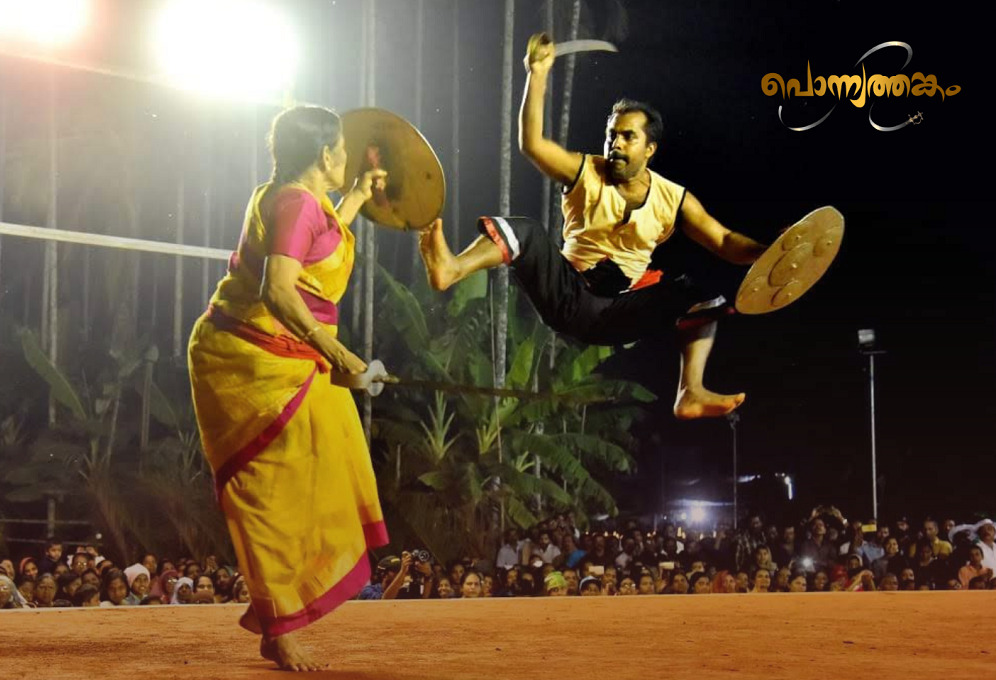
It was decided to revive the past. The same famous duel was to be recreated at the same place. They invited Choorakodi Kalari School from Vatakara (Thacholi Othenan’s place) and Gurukripa Kalari Sangham and Gurukulam Kalari Sangham from Pullyod, Kadirur (Both the Kalari schools were descendants of Mathiloor Gurukkal).
An “Ankam” between the arch-rivals at the Ezharakandam was a new experience for everyone involved. The event was inaugurated by Minister. K. P. Mohanan and people got the chance to see the majestic power and splendor of Kalaripayattu in the same place where they had heard the stories of historic fight that had happened on the same historic day – Kumbam 9th! The warriors used a variety of weapons, including daggers, sticks, spears, and axes. Their flexibility, vigor, and strength made the audience spellbound.
There was a feeling of happiness when people left the venue. The audience felt connected to their past and were proud that they were part of the history. All of them determined to continue the annual event with more grandeur.
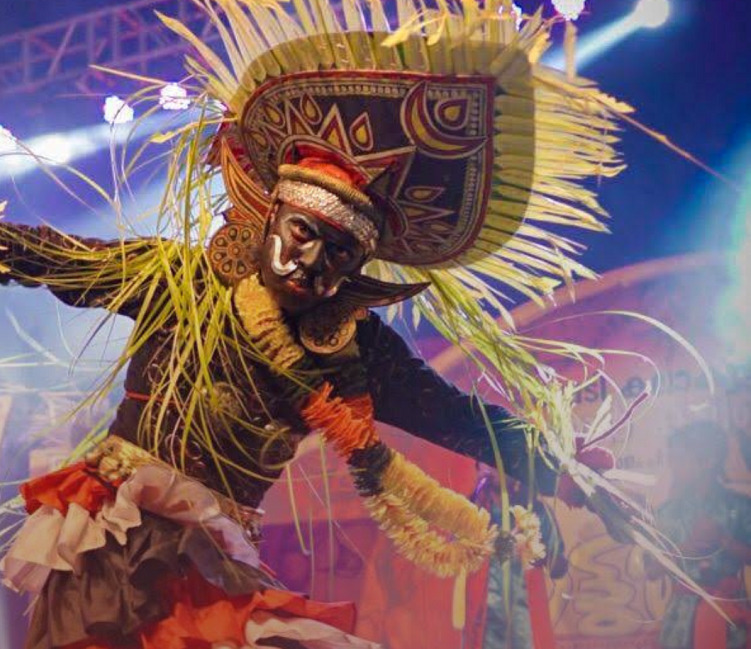
The first year’s event was well received, and the team worked to make the next year’s event even better, with more Kalari Sanghams participating. In 2016, the event was officially named “Ponnyathankam”.
Volunteers of Pullodi Patyam Gopalan Memorial Reading Room and Club started co-ordinating with Kalari Masters and schools to know more about the Kalari heritage of Kadirur and the Ezharakandam. A team visited the Lokanarkkavu temple (A very famous temple at Vatakara. Thacholi Othenan’s days start from this temple) and Thacholi Maanikyoth Kavu ( Thacholi Othenan’s family temple).
The driving force behind the Ponnyathankam at that time was the Patyam Gopalan Memorial Club. Ponnyathankam General Convenor N. P. Vinod Kumar and his young team had wild dreams about growth, a true passion for heritage, and the supreme willpower to chase the dream.
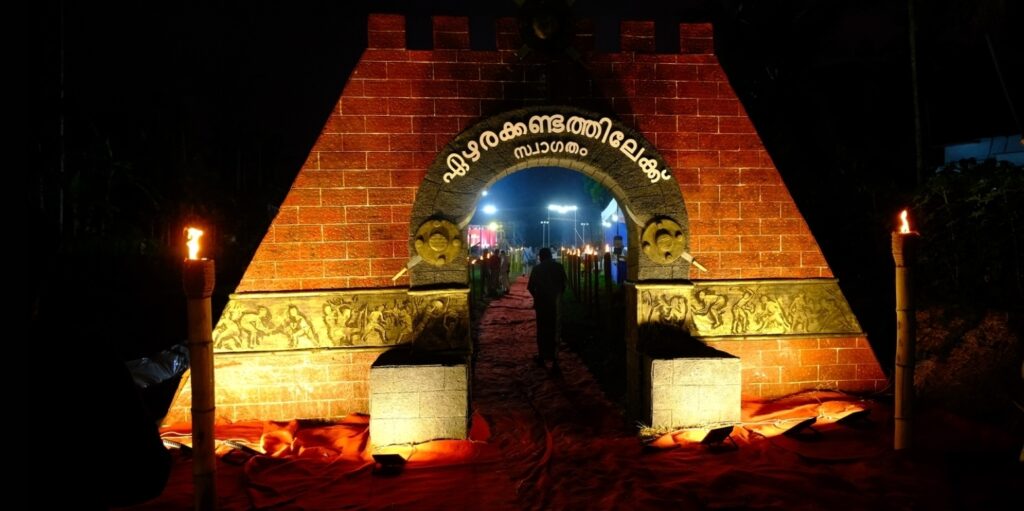
They built a magnificent gateway reminiscent of the forts of Thacholi stories. With a red carpet walkway blended with an overall scarlet theme, fire torches leading to venue, a spectacular outdoor stage, a dazzling array of colorful paintings that portray Kalari stories by native artists, and Pavilions to introduce Kalari Literature and Kalari Medicines the Ponnyathankam Arena welcomed the visitors to another world. The Fort resembling entrance became the icon of Ponnyathankam.
The event had participation from Kalari houses across Kerala. There were a lot of foreign martial arts enthusiasts and tourists at the venue to experience the true traditional Kalaripayattu along with newer schools of thought, techniques and innovation happening in the field.
In 2018, the Patyam Goplalan Memorial Club set itself on another Herculean task. Thoughts of constructing a permanent “Anka Thattu” for the Ponnyathankam occurred in their minds.
This was a daunting challenge to build, as there was no blueprint to follow or an existing model to replicate. The second part of the challenge would be to procure the land and the cost of completion which was well beyond the financial resources of the club and Ponnyathankam committee.
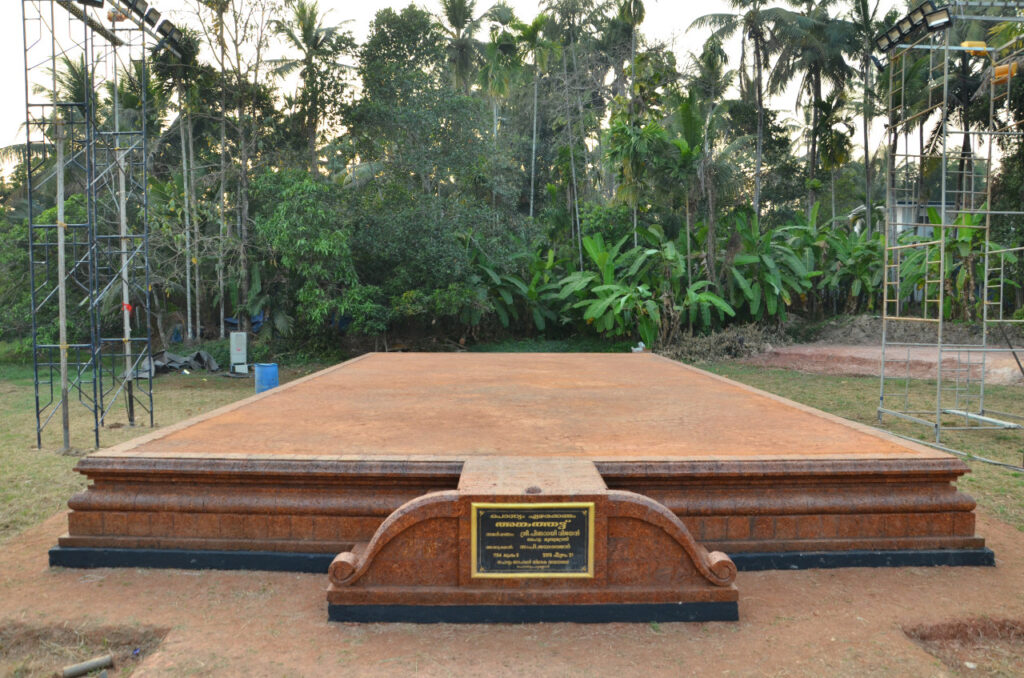
After a lot of research and deliberation, the team has finally come to a decision about the design of the traditional Kalari arena. They looked into various Kalari texts, spoke with many different Kalari masters, and visited different Kalari schools to get a better understanding of the architecture.
But how to raise the funds? The volunteers worked day and night. Every household in the village donated to the cause. They approached all nearby businessmen. The expatriates from Ponniam also contributed considerably to turn this thought into a reality.
In 2019, after a lot of research and ardent fund collection from the people around, something marvelous was constructed at the heart of Ezharakandam: the world’s only Ankathattu!
The “Ankathattu” was constructed and 25 cents of land around were procured by the Ponnyathankam committee. It was created as per the traditional design considerations and dimensions by referring to the drawings and literature.
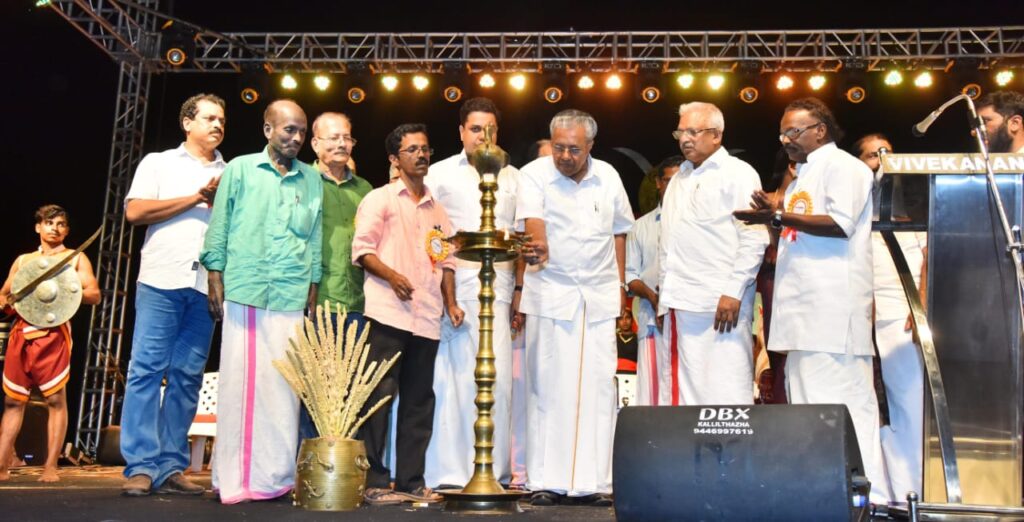
On February 21, 2019 Kerala Chief Minister Pinarayi Vijayan inaugurated and dedicated the Ponnyathankam Ankathattu to the nation. It was a proud moment for the hardworking team behind Ponnyathankam and the whole Ponniam Pullodi Village.
Now, a cultural festival, every year, a number of traditional cultural art forms is organised at the event. Programs like Naadan Pattu (folk songs), Bamboo music, Mappila Pattu, a number of rare Tribal art forms etc. created a sense of magical connection to our own plurality of culture.
